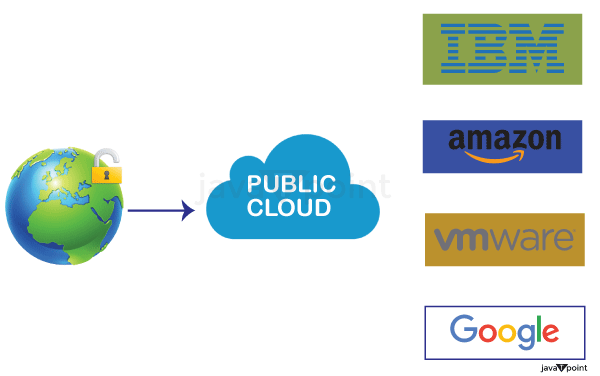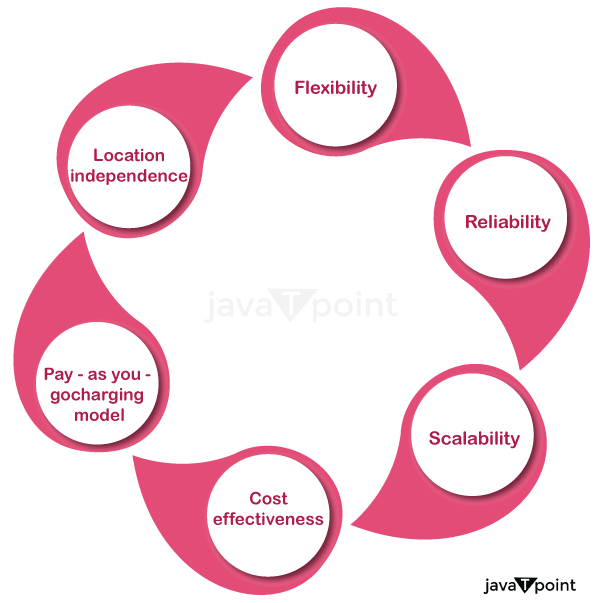Public CloudDefinition and Characteristics:The term "public cloud" describes a cloud computing architecture in which a cloud service provider makes cloud resources like processing capacity, storage, and applications accessible to the general public via the internet. Users can access and use the resources on a pay-per-use basis, and they are shared among many users. 
These are a Few Traits of Public Clouds: 
Public cloud resources are hosted on a shared infrastructure and are distributed among many users. This implies that resources-like computer capacity and storage-are not reserved for a particular user or group.
Public cloud resources are Internet-based, making it simple for users to access and use them from any location with an Internet connection.
Public cloud resources can be readily scaled up or down to meet changing user demands. Users can avoid the costs of owning and maintaining their infrastructure by only paying for the resources they utilize.
Users only pay for the resources they really use when using public cloud resources, which are often priced on a pay-per-use basis. With the help of this pricing structure, companies can easily control their spending and avoid the up-front expenditures of purchasing and maintaining their own infrastructure.
Using a self-service portal or application programming interface (API), users can provision and manage public cloud services on their own. Users can easily provision the resources they need without the need for IT support, thanks to this.
In a multi-tenant architecture, multiple users share the same infrastructure to host public cloud resources. This architecture makes it possible to utilize resources effectively while lowering costs. Because of their adaptability, scalability, and affordability, public clouds are a common type of cloud computing. Businesses of various sizes and in all sectors use it to host programs, store data, and carry out other computing functions. Public Cloud Providers Examples:On the market, there are numerous public cloud service providers. Here are a few of the more well-liked ones:
To satisfy the demands of companies of all sizes and sectors, these public cloud providers provide a variety of services and price alternatives. Considerations of Using Public Cloud:Security and Privacy Issues: Public cloud providers are in charge of protecting the underlying infrastructure, but you are ultimately in charge of ensuring the security of your applications and data. By putting in place the necessary security measures and adhering to best practices, you must make sure that your data is protected. Vendor Lock-In: Once you begin using a public cloud provider, switching to a different one or transferring your data and applications to an on-premises infrastructure may be challenging. Limited Customization: Public cloud providers provide a variety of services and solutions, but they might not fully satisfy all of your company's unique requirements. There might be little room for customization, and you could have to give up some functions. Downtime: Due to upkeep, upgrades, or unplanned outages, public cloud services may encounter downtime. You must have backup plans in place to lessen the effects of such downtime on your company. Low Security: Public Cloud is less secure because resources are shared publicly. Advantages of Public CloudLow Cost The public cloud has a lower cost than the private or hybrid cloud, as it shares the same resources with a large number of consumers. Pay-as-you-go pricing models are available from public cloud providers, allowing organizations to only pay for the resources they really utilize. Location Independent The public cloud is location independent because its services are offered through the Internet. Save Time In the Public cloud, the cloud service provider is responsible for the management and maintaining data centers in which data is stored, so the cloud user can save time in establishing connectivity, deploying new products, releasing product updates, and configuring and assembling servers. Quickly and easily set up. Organizations can easily buy public cloud on the internet and deploy and configure it remotely through the cloud service provider within a few hours. Business Agility The public cloud provides the ability to elastically re-size computer resources based on the organization's requirements. Scalability The public cloud offers scalable (easy to add and remove) and reliable (24*7 available) services to users at an affordable cost. Due to the availability of computing resources on demand from public cloud providers, enterprises may simply scale up or down their infrastructure as needed. Reliability and Availability By using redundant hardware and architecture, public cloud providers offer high levels of reliability and availability, guaranteeing that your applications and data are always accessible. Flexibility Public cloud service providers provide a wide selection of solutions and services that can be tailored to match the particular requirements of your company. Security To guarantee the protection and privacy of your data, public cloud providers offer strong security features and compliance certifications.
Next TopicPrivate Cloud
|
 For Videos Join Our Youtube Channel: Join Now
For Videos Join Our Youtube Channel: Join Now
Feedback
- Send your Feedback to [email protected]
Help Others, Please Share










